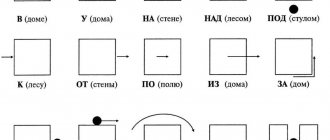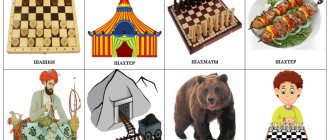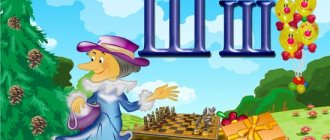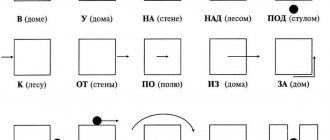Tongue twisters starting with the letter r
There is grass in the yard
There is grass in the yard, there is firewood on the grass Do not cut wood on the grass in the yard.
Karl at Clara's
Karl stole corals from Clara, Clara stole a clarinet from Karl.
The ships were tacking
The ships tacked and tacked, but did not tack.
Patter about shopping
Tell us about your purchases. What purchases are you talking about? About shopping, about shopping, About my shopping.
Tongue twister about an otter
The otter dived into the otter's bucket. The otter drowned in a bucket of water.
Greek rode across the river
The Greek was driving across the river, He saw the Greek - there was a cancer in the river. He put the Greek's hand into the river, Cancer grabbed the Greek's hand - tsap!
Otter in the tundra
In the depths of the tundra Otters in spats Poking into buckets Cedar kernels!
Ripping the leggings off an otter In the tundra I'll wipe the kernels of the cedars with the otter I'll wipe the otter's face with the leggings Cannonballs in buckets Otter into the tundra!
Tongue twisters with hissing sounds
Tongue twister starting with the letter Z
The bear cub was frightened, Hedgehog with the hedgehog and the hedgehog, Swift with the swift and the little haircut.
Tongue twister starting with the letter H
Four turtles have four baby turtles.
Four little devils
Four little black little devils drew a drawing in black ink.
Tongue twister starting with the letter Sh
Old talkative women live in a hut at the edge of the forest. Every old lady has a basket, There is a cat in every basket, Cats in baskets sew boots for old ladies.
Sewn by Sasha
Sasha sewed a hat for Sashka, Sashka knocked off a bump with his hat.
Sasha was walking along the highway
Sasha walked along the highway and sucked on a dryer.
In the hut
In the hut the yellow dervish from Algeria rustles with silks and, juggling with knives, eats figs.
Cuckoo in the hood
Cuckoo bought a hood. Put on the cuckoo's hood. How funny he is in the hood!
Tongue twister starting with the letter Ш
Two puppies, cheek to cheek, nipping at the brush in the corner.
OPTIONS OF TASKS AND GAMES WITH TONGUARDS FOR THE SOUND L FOR CHILDREN
— Game “From Turtle to Rocket”
- Find words in the tongue twister with the sound L and with the sound L.
- Find words in a tongue twister in which the sound L (or the sound L) is at the beginning of the word, in the middle of the word, at the end of the word.
- Come up with your own funny sentence with this word (fable - confusion).
- Which word got lost? (The adult replaces the word from the tongue twister with another word that is inappropriate in meaning, the children guess which word got lost and which word needs to be put in the tongue twister).
- Take two words with the sound L from the tongue twister and combine them into one sentence.
- Say a tongue twister cheerfully, sadly, amazed, admiringly, tiredly and with other intonations. You can play “Tell me like me” - the child repeats the intonation, pauses of the host - the adult in pronouncing the tongue twister.
- Guess the intonation with which your playing partner pronounced the tongue twister.
— The correct way to say a tongue twister out loud is first slowly (this is how Tortilla the turtle would say it), then at an average pace (this is how Artemon would say it), then quickly and quickly (this is how Toropyzhka says tongue twisters).
- Catch the ball from the leader and, in response, repeat the tongue twister and throw the ball further either to the leader or to the next child.
Funny tongue twisters
Mouse
The mouse crawled under the lid, To gnaw the crumb under the lid, The mouse must be dead - The mouse forgot about the cat!
Koschey
Skinny, weak Koschey drags a box of vegetables.
forty forty
It's a hassle to catch a cunning magpie, but forty forty is forty hassle.
Parrot
The parrot said to the parrot: I will parrot you, parrot. The parrot answers him: Parrot, parrot, parrot!
Karasyonok
Once upon a time I gave a crucian carp a coloring book. And Karas said: “Color the fairy tale, Little Karas!” On the coloring page of Little Kara - Three cheerful little pigs: Little Kara has repainted the piglets into little crucians!
Complex tongue twisters
Tongue twister about the Chinese
Once upon a time there lived three Chinese - Yak, Yak-Tsidrak, Yak-Tsidrak-Tsidron-Tsidroni, and three more Chinese women - Tsypa, Tsypa-Dripa, Tsypa-Dripa-Lampomponi. Yak got married to Tsypa, Yak-Tsidrak to Tsypa-Drip, Yak-Tsidrak-Tsidron-Tsidroni to Tsypa-Drip-Lampomponi. So they had children: Yak with Tsypa - Shah, Yak-Tsidrak with Tsypa-Drypa - Shah-Sharah, Yak-Tsidrak-Tsidroni with Tsypo-Drypa-Lampoponi - Shah-Sharah-Sharoni.
What is not
No apricot, coconut, radish, Halibut, vinegar, kvass and rice, No compass, longboat and rope, Thermos, press, Indian sailor, No bass, no taste, weight and demand, No interest - no question.
Feast at Kira and Fira
Kira and Fira had a feast in the apartment: Fakir ate marshmallows and Fakir drank kefir. But Fira and Kira did not drink kefir, did not eat marshmallows - they fed the fakir.
Blackberries and strawberries
If you didn’t live near a blackberry tree, but if you lived near a strawberry tree, then strawberry jam is familiar to you and blackberry jam is not at all familiar to you. If you lived near a blackberry tree, then it means that you are familiar with blackberry jam, and not at all with the usual strawberry jam. But if you lived near a blackberry tree, and if you lived near a strawberry tree, and if you didn’t spare time for the forest, then that means you ate excellent blackberry jam, strawberry jam every day.
English tongue twisters with translation
Marmot
How much wood would a woodchuck chuck if a woodchuck could chuck wood?
How much wood would a woodchuck throw if a woodchuck could throw wood?
Zoo
Can you imagine an imaginary menagerie manager managing an imaginary menagerie?
Can you imagine an imaginary zoo manager running an imaginary zoo?
Oyster
Any noise annoys an oyster but a noisier noise annoys an oyster most.
Any noise irritates the oyster, but louder noise irritates the oyster even more.
Shells
She sells sea shells at the sea shore, the shells she sells are the sea-shore shells, I'm sure.
She sells seashells on the seashore, the shells she sells are seashells, I'm sure.
Modern tongue twisters
Who wants to talk
Whoever wants to talk must pronounce everything correctly and clearly, so that everyone can understand. We will talk and we will pronounce it so correctly and clearly, so that everyone can understand.
Coconut
Coconut cookers boil coconut juice in coconut cookers.
Gazelle
The eyes of a gazelle stare at the beaver from behind the spruce.
Lotto
Count Toto plays lotto, and Countess Toto knows that Count Toto plays lotto, if Count Toto knew that Countess Toto knows that Count Toto plays lotto, then Count Toto would never have lived I wouldn't play lotto.
HOW TO CORRECTLY USE TONG TWISTERS FOR THE SOUND L IN THE SPEECH DEVELOPMENT OF PRESCHOOL CHILDREN
First rule. The main rule for using tongue twisters in the development of children's speech: the text of the tongue twister that we offer to the child must contain those sounds that the child already knows how to pronounce correctly. In this case, we reinforce the correct pronunciation of the sound l and develop the child’s diction.
If we include in the tongue twister those sounds that the child pronounces incorrectly, then we do not develop the child’s speech, but, on the contrary, we reinforce the incorrect pronunciation of sounds in his speech! Therefore, the correct selection of tongue twisters individually for each child, taking into account the characteristics of his speech development, is so important.
Second rule. An adult carefully observes the child’s pronunciation of the sound L in tongue twisters and corrects the child if necessary.
When a child pronounces a tongue twister, he may make a mistake and begin to pronounce the sound L incorrectly again. In this case, you need to remind him of the correct pronunciation, say the tongue twister more slowly and clearly, syllable by syllable. And then gradually speed up its pace.
Third rule. If ancient words and expressions are found in a tongue twister, then we clarify their meaning in a conversation with the child. For example, in the tongue twister “The ox fell into the wolf’s den,” you need to talk with the child about:
- who is the ox?
- Is he afraid of the wolf and his lair?
- With what intonation is it better to read this tongue twister?
Fourth rule. Tongue twisters are a language game, and a game is always fun and interesting. This is exactly what we do with tongue twisters with the sound L! The list of tasks and games given below will help you.
Other famous tongue twisters
Myla Mila
Mila washed the bear with soap, Mila dropped the soap. Mila dropped the soap, but didn’t wash Mishka with soap.
From the clatter of hooves
From the clatter of hooves, dust flies across the field.
Squirrel
White snow. White chalk. White sugar is also white. But the squirrel is not white. It wasn't even white.
Jackdaws
One day I was scaring a jackdaw when I saw a parrot in the bushes. And that parrot says: “You scare the jackdaws, pop, scare, but scare the jackdaws in the bushes, don’t you dare scare the parrot.”
Sonya on a sled
Senka and Sanka are carrying Sonya on a sled.
Rules for the pronunciation of “linguists”
To achieve maximum results from repeating pure phrases, you must adhere to the following rules:
- You must first pronounce the phrases slowly and clearly.
- If we are talking about a child, he must first explain the meaning of the phrase, since it does not always contain understandable words.
- The second time it’s worth saying the phrase faster.
- The third time, say quickly and repeat again.
- For adults, it is not enough to simply strive to speak quickly. You should also change your expression and intonation. Because diction training also includes expressiveness of speech.
You should always start with short sayings. They are easier to remember and pronounce. There is no point in stopping there. After automating the short “tongue rollers,” you can move on to more complex and longer ones. If short phrases are given with ease and without difficulty, this indicates that you are ready to take new steps towards ideal diction.
Special folklore genre
Tongue twisters, as a small genre of folk art, were composed in a poetic and humorous form. Words are worded in such a way that the sounds in them are repeated in a special way, so each pure phrase has its own phonetic pattern. The comedy of such poems lies in the almost always inevitable slippage from a difficult phrase, the involuntary transformation of similar-sounding syllables into a funny version.
Funny tongue twister poems can be roughly divided into two types - some are based on the repetition of a difficult sound for the little ones, others clash phonemes in such a way that even for an adult who fully speaks their native language, they are difficult for clear pronunciation.
Pure sayings, like nursery rhymes, grow with the child. First a fun, entertaining game with educational elements, later a more complicated school of diction exercises. They have one important indicator - the basic unit of rhythm, where you can clearly see the end of a line with the same number of syllables. Folk performers “spoke quickly” in one breath, so tongue twisters consist of small sentences, without dividing points that would disrupt the speed of pronunciation with unnecessary pauses.
Training texts provide an opportunity to plunge headlong into the world of phonetics, the variety of sounds in words, phrases, phrases; they enrich and expand the vocabulary, triggering the mechanisms of thinking and imagination, adding an element of creative search and personal interest. The brevity, capacity, rhythm, and dynamism of statements distinguish them from other speech exercises. The play of sounds that get confused, disappear somewhere, replace each other or are mirrored, tease and invite you to measure your strength with them, tests the memory and mobility of the speech apparatus.
Speed-speaking is used as training speech exercises by adults whose professions involve public speaking - presenters, announcers, artists, singers, lecturers, even politicians. By quickly pronouncing tongue twister poems, you can not only “break your tongue,” but also effectively develop articulation, correct speech defects, and tongue-tiedness. Faithful and reliable assistants on the path to honing diction, pure speech is an excellent material for improving phonemic awareness. The best results can be achieved if you pronounce them slowly at first, pronouncing each word clearly. By gradually accelerating the tempo, the sound of different sounds will be adjusted and corrected.
Helpful Tips:
- Learning tongue twisters using mnemonic tracks will greatly facilitate this process. The child perceives the word through an image - a picture, model, symbol, sign. And mnemonics are aimed precisely at this - replacing words with images.
- Before you start working with these mnemonic tracks, you need to consolidate the skills of clear pronunciation and distinguishing the sound “L” in syllables and words. We teach kids to highlight this sound at the beginning, middle and end of words. Coloring pages for the sound “L” will help you with this.
- All classes on sound automation are based on the principle of simple to complex.
- Each lesson should begin with a warm-up, these are 2-3 articulatory gymnastics .
- Next, we move on to the isolated pronunciation of the sound “L”, automation in syllables, words, phrases, sentences and other game exercises.
- If the child does not learn or it is difficult for him to complete new tasks, you can go back and consolidate the pronunciation on simpler material.
- When selecting tongue twisters, consider which sounds the child pronounces correctly and which ones he does not. Accordingly, select only those tongue twisters that the child can say correctly, pronouncing ALL SOUNDS . Otherwise, you can not only fail to develop the child’s speech, but, on the contrary, worsen it by reinforcing incorrect pronunciation.
- It is imperative to ensure the correct pronunciation of the sounds “L”, “L” when pronouncing tongue twisters. If the child does not succeed, stop him and say this word slowly. Repeat it several times.
- First learn tongue twisters at a slow pace, perhaps syllable by syllable. Gradually increase the pace.
- Pay attention to the clarity of all words for the child. Check with your child to see if he understands all the words; if not, explain their meaning.











